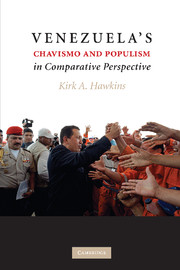Book contents
- Frontmatter
- Contents
- List of Tables
- Preface
- Acknowledgments
- 1 Introduction
- 2 Chavismo, Populism, and Democracy
- 3 Measuring the Populist Discourse of Chavismo
- 4 Party System Breakdown and the Rise of Chavismo
- 5 The Causes of Populism in Comparative Perspective
- 6 Populist Organization: The Bolivarian Circles in Venezuela
- 7 Populist Policy: The Missions of the Chávez Government
- 8 Conclusion
- Appendix A The Populist Speech Rubric
- Appendix B Test of the Sampling Technique
- Appendix C Test of Interaction Effects
- References
- Index
1 - Introduction
Published online by Cambridge University Press: 17 May 2010
- Frontmatter
- Contents
- List of Tables
- Preface
- Acknowledgments
- 1 Introduction
- 2 Chavismo, Populism, and Democracy
- 3 Measuring the Populist Discourse of Chavismo
- 4 Party System Breakdown and the Rise of Chavismo
- 5 The Causes of Populism in Comparative Perspective
- 6 Populist Organization: The Bolivarian Circles in Venezuela
- 7 Populist Policy: The Missions of the Chávez Government
- 8 Conclusion
- Appendix A The Populist Speech Rubric
- Appendix B Test of the Sampling Technique
- Appendix C Test of Interaction Effects
- References
- Index
Summary
The provision for recall referendum is … giving shape to a new democratic model in Venezuela, not the old democracy of the elites.
Hugo Chávez, June 2004On 3 June 2004, Venezuela's National Electoral Commission (Consejo Nacional Electoral, or CNE) announced that a recall election would be held against President Hugo Chávez in August.
The announcement marked a significant victory for the opposition after years of tumultuous, polarizing conflict. Earlier, in April 2002, a violent clash between opposition demonstrators and government supporters in Caracas precipitated a military coup that removed Chávez from power for 36 hours. Subsequent efforts at reconciliation failed, and for two months the opposition led a devastating national strike that paralyzed the oil industry and much of the private sector. Finally, in May 2003, after negotiations sponsored by the Organization of American States (OAS), representatives of the government and the opposition signed an agreement committing both sides to a legal, nonviolent solution and opening the way for the presidential recall.
The recall process formally began with a signature drive by the opposition from 28 November to 1 December 2003. The effort generated an overwhelming response in favor of the recall, with 3.4 million signatures collected, well beyond the 2.5 million required by the constitution. The process nearly stalled after the CNE took five months to verify the signatures and then, in a controversial decision, found irregularities in over 900,000 of them.
- Type
- Chapter
- Information
- Publisher: Cambridge University PressPrint publication year: 2010

